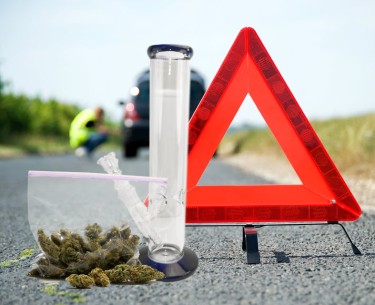
Legalizing marijuana reduces alcohol-related pedestrian deaths, a new study says
Marijuana legalization linked to reducing alcohol-related pedestrian deaths
According to data, about 1 in 7 pedestrian deaths is caused by a drunk driver.
The National Highway Traffic Safety Administration states that about 32 people are killed by drunk driving every day. That equates to one death every 45 minutes, a senseless and entirely unnecessary preventable death. It has been known for a long time that alcohol consumption severely affects drivers, but it is still practiced. Alcohol alters judgement, severely impairs concentration, impairs coordination and vision – all of which contribute to a driving impairment that can kill pedestrians.
However, with the legalization of cannabis, more and more people are using marijuana as a substitute for alcohol. And that has helped reduce pedestrian deaths from impaired driving.
A new study, conducted by two Florida Polytechnic University researchers, analyzed the link between cannabis legalization and pedestrian deaths from 1985 to 2019. The study, published in the research journal of the International Association of Traffic and Safety Sciences, found that both recreational and medicinal cannabis legalization has been associated with a decrease in pedestrian deaths, including those linked to alcohol.
“Since 2019 we have found that liberalization has been associated with fewer pedestrian deaths, not more. In addition, the pattern is consistent with the alcohol substitution hypothesis. In particular, the induced decrease in post-liberalization alcohol-related deaths is large enough to more than offset any additional deaths due to marijuana use,” the researchers concluded.
older studies
But access to legal marijuana and reducing traffic fatalities is by no means a new association. Studies going back to 2011 have found the same results. A November 2011 study by researchers at the University of Colorado Denver found that medical marijuana laws were linked to a 9% drop in road deaths and a 5% drop in beer sales. For the study, they analyzed data from multiple sources such as the National Survey on Drug Use and Health, the Fatality Analysis Reporting System, and the Behavioral Risk Factor Surveillance System.
“Our research suggests that legalizing medical marijuana reduces traffic fatalities by reducing alcohol consumption among young adults,” said Daniel Rees, professor of economics at the University of Colorado Denver. This is the first study to ever analyze a link between medical marijuana laws and traffic fatalities.
“We were amazed at how little is known about the impact of medical marijuana legalization,” says Rees. “We looked at traffic deaths because there is good data and the data allows us to test whether alcohol played a role.”
According to co-author D. Mark Anderson, these findings are important when viewed from a legislative perspective. “Traffic accidents are an important outcome from a policy perspective because they are the leading cause of death for Americans ages five to 34,” he says.
Meanwhile, another study from 2013 came to similar conclusions. Researchers from Montana State University, the University of Colorado and the University of Oregon examined data on traffic deaths and alcohol consumption from 1990 to 2010.
“Using individual-level data from the Behavioral Risk Factor Surveillance System (BRFSS) … we find that MMLs (medical marijuana laws) are associated with a reduction in the likelihood that a person has used alcohol in the past month, binge drinking and the number of drinks consumed,” they said.
In addition, the researchers acknowledge that reducing alcohol consumption is likely responsible for the decrease in alcohol-related road deaths.
“Using data from the Federal Fatality Analysis Reporting System (FARS) for the period 1990-2010, we find that traffic fatalities decreased by 8-11 percent in the first full year after legalization,” they wrote. “Why is legalizing medical marijuana reducing road deaths? Alcohol consumption seems to play a key role in this. Legalization of medical marijuana is associated with a 7.2 percent decrease in traffic fatalities where no alcohol involvement was reported, but this estimate is not statistically significant at conventional levels. In comparison, legalizing medical marijuana is associated with a 13.2 percent decrease in deaths where at least one driver involved had a positive BAC (blood alcohol concentration) score,” they added.
“The negative relationship between legalization of medical marijuana and alcohol-related traffic deaths supports the hypothesis that marijuana and alcohol are substitutes,” they concluded.
Cannabis is a better alternative to alcohol
Increased access to legal marijuana laws, whether for medical or recreational purposes, is reason enough for more people to give up alcohol and use marijuana instead. It’s bad enough that drunk driving can kill thousands on the road, but it also harms anyone who consumes it, especially those with chronic use or binge drinking.
More and more people are realizing the benefits of consuming marijuana instead. Not only can it help reduce alcohol consumption, but it can also largely eliminate dependence on it and improve families and societies as a whole. While alcohol has been notorious for tearing families apart and destroying relationships, cannabis is a better substitute instead. And when it comes to driving, always drive sober – it’s both dangerous and illegal to drive while under the influence of alcohol, regardless of the substance.
MORE ABOUT VEHICLES AND WEEDS, READ MORE..

ROAD ACCIDENTS WILL NOT INCREASE WITH LEGALIZATION, SAYS INSURANCE COMPANIES

Post a comment: